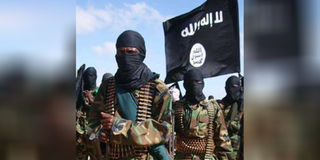Al Shabaab: Advocating for comprehensive post-liberation framework

Al-Shabaab militants in Elasha Biyaha, Somalia, on February 13, 2012.
What you need to know:
- This group's operations have extensively disrupted south-central Somalia, leading to radicalisation of youth, numerous deaths and injuries, and forced displacement of people.
- The Federal Government of Somalia’s (FGS) large-scale offensives, through coordinated military operations has been effective in reducing Al-Shabaab's influence
For nearly two decades, since mid-2006, Somalia has contended with the destabilising presence of Al Shabaab (AS), a militant group characterised by its violent tactics and extremist ideology.
Disrupted Somalia
This group's operations have extensively disrupted south-central Somalia, leading to the radicalisation of youth, causing numerous deaths and injuries, and the forced displacement of many individuals as well as the wider populace.
These activities have severely affected the socio-economic stability of the country.
Military campaign
Since his re-election in May 2022, President Hassan Sheikh Mohamud has initiated an intensified military campaign against AS, marking a strategic shift in Somalia's approach to combatting the militant group.
This campaign, described as a 'total war' against extremists, aims to regain control of territories held by Al-shabaab. The government's subsequent efforts have focused on removing Al-shabaab from strategic locations, contributing to operational achievements against the militants and supporting the stabilization of south-central Somalia.
The Federal Government of Somalia’s (FGS) large-scale offensives, through coordinated military operations with support from local communities and international partners, has been effective in reducing the group's influence and recovering territory. This includes enhanced mobility of people and goods between Mogadishu and central regions, and a reduction in terrorist attacks on urban centers.
However, lasting security extends beyond military success.
While re-establishing security is essential, it must be complemented by a detailed post-liberation strategy and stabilisation roadmap.
Military achievements
This comprehensive approach is crucial for not only sustaining military achievements, but also addressing the underlying causes of extremism, providing essential services to communities, and laying the groundwork for sustainable development.
Without this strategic framework, the potential for instability and the resurgence of militant activities persists, highlighting the need for a plan that addresses Somalia's immediate and long-term requirements.
This necessitates a strategic approach that not only offers a comprehensive response to post-conflict challenges but also systematically integrates humanitarian support, stabilization activities, and development projects as interconnected components of a strategic continuum, ensuring a cohesive and sustainable pathway to rebuilding and growth.
In line with the strategic continuum set out, firstly addressing the humanitarian crisis remains a critical challenge in post-liberation Somalia, with millions affected by years of conflict, displacement, and insecurity. Immediate intervention is necessary to ensure access to fundamental resources such as food, clean water, healthcare, and education, which are crucial for maintaining public health and stability. It is an approach that aims to address immediate needs and support the overall resilience of affected communities.
That said, the efficacy of aid delivery by humanitarian organizations is dependent on structured government support and coordination, ensuring reach and impact in all affected regions.
Conflict to stability
Secondly, the transition from conflict to stability requires a strategic approach that engages local communities and builds trust in government institutions.
It is essential to implement a strategy that acknowledges the crucial connection between counterinsurgency measures and stabilization as core elements of Somalia's development and state-building efforts.
This strategy should focus on fostering reconciliation, justice, and inclusivity to address grievances and mitigate the risk of renewed violence. Engaging in community-led initiatives that promote peace and reconciliation are key to bridging divisions and establishing a foundation of unity and resilience within the population.
Concluding the strategic continuum, beyond immediate humanitarian and stabilization measures, significant investments in development, such as infrastructure, education, healthcare, and economic opportunities are essential for rebuilding the socio-economic framework.
For instance, programmes aimed at sustainable development will facilitate job creation, support marginalized communities, and mitigate extremism by providing constructive alternatives to violence and radicalization.
It is also essential to highlight that coordinating these initiatives is critical to ensuring that resources are utilized efficiently, particularly when considering the substantial investments made into stabilization programs over the years.
Inclusive and participatory
We must actively ensure accountability at all levels to maximise return on investment and deliver quality, impact, and value to Somalia's recovery and development. Similarly, these strategies must be inclusive and participatory, engaging women, youth, and minority groups.
Evidently, the gaps in policies are apparent, highlighting the Special Envoy’s vision to translate the countries needs into effective policies.
Somalia requires a strategic framework for Stabilisation and Civilian Protection adopted as a national policy that is embedded within the National Development Plan and championed at the highest office.
This strategic objective, led by the Office of the Special Envoy, addresses the processes of improving military (restoration of law and order), political (governance), economic (rehabilitation and development), and social conditions (justice and reconciliation) simultaneously.
To conclude, success in post-liberation Somalia is a nation united in peace, empowered through development, and thriving with opportunity for every Somali citizen.
The writer, Hon. Omar Hashi, is a Special Presidential Envoy for Stabilization and Civilian Protection, and a Member of Parliament at the Federal Parliament of Somalia.




